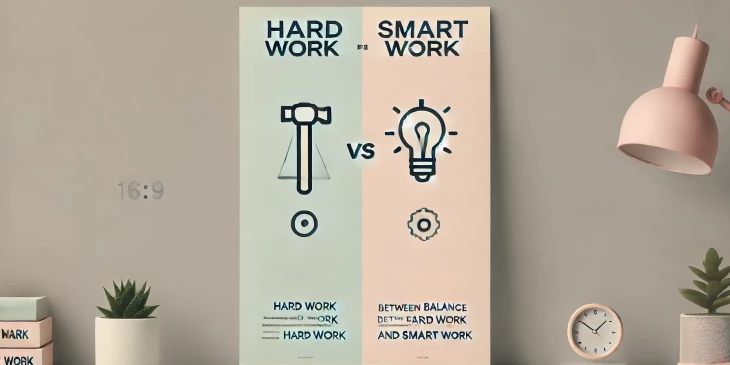In the race toward success, two popular paths often cross our minds: hard work and smart work. But what’s the difference between them, and how do they impact our journey to achieve goals? Let’s take a closer look at both, with relatable examples, key insights, and a sprinkle of fun facts along the way.
Understanding Hard Work: Effort and Dedication
Hard work is the traditional approach to achieving success. It revolves around putting in maximum effort, time, and dedication to complete a task. When we think of hard work, images of people staying late at the office, burning the midnight oil, and constantly pushing their limits come to mind. This method is tried and true—if you work hard, you’ll eventually get results.
Example of Hard Work: Imagine a college student who spends hours reading textbooks, making notes, and practicing problems for an upcoming exam. They put in long hours and focus on every single detail, believing that the more they study, the better their results.
Pros of Hard Work:
- Builds strong discipline and resilience.
- Offers a comprehensive understanding of the subject.
- Instills a sense of responsibility and persistence.
Cons of Hard Work:
- Can lead to burnout if not balanced with rest.
- Sometimes requires more time than necessary.
- May not always yield the best results if not paired with strategy.
Understanding Smart Work: Efficiency and Strategy
On the other hand, smart work is all about using efficient methods and strategic planning to achieve the same goal with less effort. Instead of spending countless hours, people working smartly find shortcuts, optimize their approach, and focus on key areas that will yield maximum results.
Example of Smart Work: Take the same college student preparing for an exam, but this time, they identify the most critical chapters, focus on the most important problems, and use mnemonic devices to remember information. They don’t spend endless hours studying; instead, they prioritize key areas and make use of techniques that save time.
Pros of Smart Work:
- Saves time and energy by focusing on essentials.
- Reduces stress and burnout.
- Enhances productivity by targeting high-impact tasks.
Cons of Smart Work:
- Can sometimes lead to shortcuts that compromise quality.
- Requires proper planning and understanding of priorities.
- Can lead to a superficial understanding of the subject.

Hard Work vs. Smart Work: A Direct Comparison
Goal Achievement
- Hard Work: Achieves goals but often at the cost of time and energy.
- Smart Work: Achieves goals faster, with time to spare for other pursuits.
Learning Experience
- Hard Work: Leads to a deep and thorough understanding of the subject.
- Smart Work: Focuses on essential information, which can sometimes lack depth.
Risk of Burnout
- Hard Work: High, due to continuous effort and lack of balance.
- Smart Work: Lower, as it incorporates efficiency and often prioritizes well-being.
Impact on Growth
- Hard Work: Great for building discipline and resilience, often resulting in long-term benefits.
- Smart Work: Helps achieve quick wins, builds adaptability, and promotes innovative thinking.

Balancing Hard Work and Smart Work: The Perfect Recipe
While it’s easy to get into debates about which one is better, the truth is that the ideal approach combines both hard work and smart work. Here’s a step-by-step roadmap for balancing these two approaches:
Step 1: Set Clear Goals
Before you begin any task, take time to understand what you’re aiming for. When your goals are clear, it’s easier to know when to dig deep and when to switch to a smarter approach.
Step 2: Identify Key Tasks
List out the tasks that will lead you closer to your goal. Identify which ones require hard work for deeper understanding and which ones could benefit from a more efficient, smart approach.
Step 3: Work Smart to Build a Strategy
Look at the bigger picture and come up with a strategy. For instance, if you’re working on a project, create a roadmap of tasks with deadlines. This is where smart work comes in—use tools, techniques, and prioritize to streamline your approach.
Step 4: Apply Hard Work Where It’s Needed
Once you have a strategy, work hard on the tasks that require dedication and time. Don’t cut corners on things that are critical to quality or understanding.
Step 5: Reflect and Adjust
Finally, as you work toward your goal, reflect on what’s working and what isn’t. This step is all about feedback. Adjust your approach, find new strategies, and be open to changing how you work based on what you learn.

Fun Facts about Hard Work and Smart Work
- Did you know? Research shows that focusing on high-priority tasks (smart work) can reduce work time by up to 50% without compromising results.
- Surprising stat: According to a study, over 75% of employees believe that being busy equates to productivity, though it’s smart work that often yields better results in less time.
- Ancient wisdom: The famous fable of the tortoise and the hare showcases hard work vs. smart work. The tortoise’s hard work brought him to the finish line steadily, while the hare’s fast-paced yet unstrategic approach led to his downfall.
- Productivity hack: Productivity apps and tools (a part of smart work) can increase efficiency by 30%, allowing professionals to accomplish tasks in less time.

Conclusion: The Power of Working Smarter and Harder
In the journey of achieving goals, hard work and smart work are not opposites but rather two sides of the same coin. To truly excel in any area, blending both approaches creates a well-rounded strategy that not only helps us reach our goals but also keeps us engaged, less stressed, and open to learning.
In many cases, smart work can act as the vehicle, and hard work becomes the fuel that keeps it going. By combining these approaches, you can achieve results faster and more efficiently, without compromising on quality.


Leave a Comment
To post comment, please